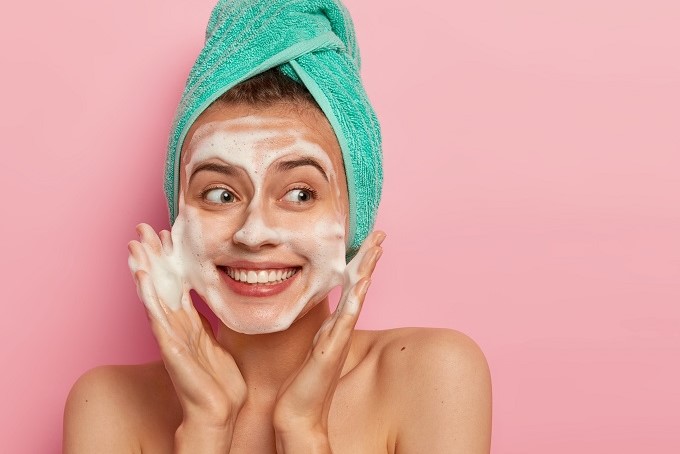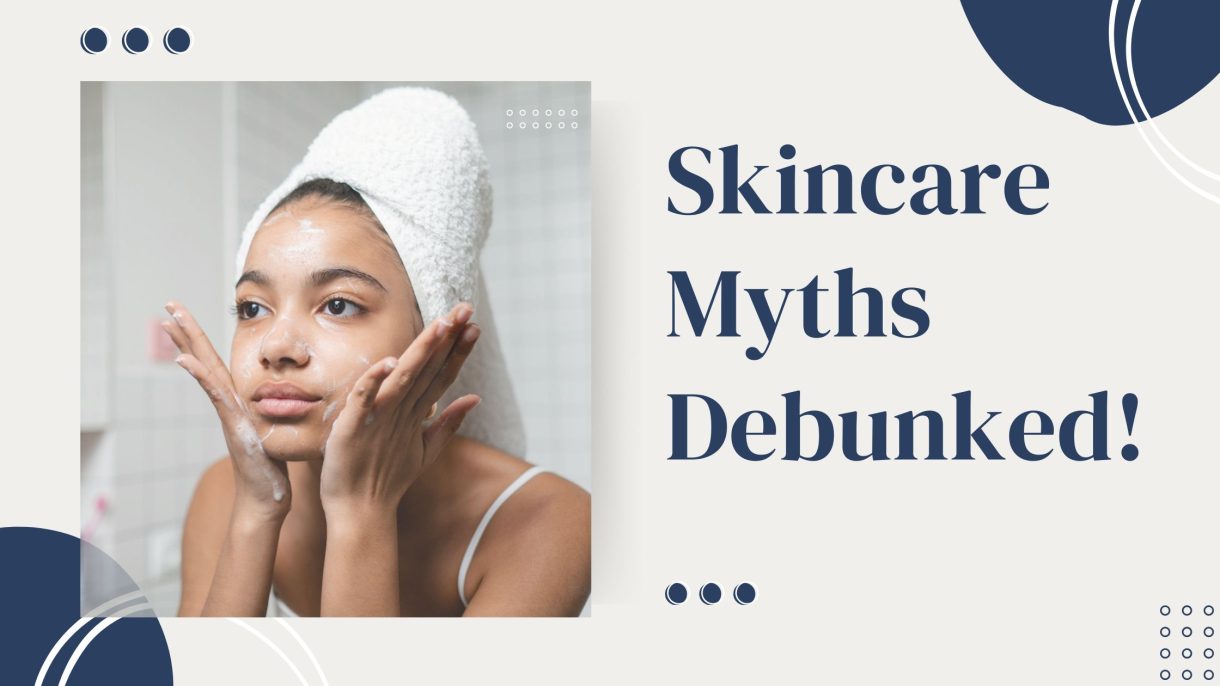Explore the often confusing world of skincare as we debunk common myths that have prevailed over the years. Skincare is a deeply personal and essential part of our daily routines, yet misinformation is rife, leading to confusion and potentially harmful practices. Understanding your skin and the products you use is crucial in maintaining its health and vitality. In this article, we’ll explore and clarify some of the most common skincare myths, separating fact from fiction. With insights from experts and scientific research, we aim to provide clarity, enabling you to make informed decisions about your skincare regimen. Read on to unravel these myths and better understand the truth behind achieving healthy, radiant skin.
Myth 1: All Natural Products are Always Better for the Skin

The idea that all natural products are unfailingly better for the skin is a common skincare misconception. While natural products can offer many benefits, they are not inherently superior to synthetic ones.
“Natural” is a loosely defined term in the skincare industry, often used as a marketing ploy. This ambiguity allows products containing small amounts of natural ingredients to claim the “natural” label. However, being natural does not guarantee safety or effectiveness. For example, poison ivy is entirely natural, but clearly harmful to the skin.
In contrast, many synthetic ingredients are created in laboratories for their beneficial effects on skin. Retinol, a derivative of vitamin A, and hyaluronic acid, a potent moisturizer, are both synthetic and have demonstrated effectiveness in numerous scientific studies.
Stability and shelf life are other factors to consider. Natural products can spoil faster, lose efficacy, and may even become harmful due to bacterial growth. Also, certain natural ingredients, such as essential oils, can cause allergic reactions or skin irritation in sensitive individuals.
Myth 2: Drinking Lots of Water Can Single-Handedly Clear Your Skin
Drinking Lots of Water Can Single-Handedly Clear Your Skin” is a prevalent skincare myth that needs debunking. While hydration is crucial to maintaining overall health, including skin health, relying solely on water to clear skin issues like acne, wrinkles, or hyperpigmentation is a misconception.
Hydration can aid in keeping your skin moisturized and maintaining its elasticity, but it’s not a magical solution to every skin issue. Clearing your skin requires a multi-faceted approach. This includes a balanced diet filled with vitamins, antioxidants, and omega-3 fatty acids, an effective skincare routine targeted to your specific needs, and leading a healthy lifestyle overall.
It’s also crucial to consider that many skin issues are caused by factors like genetics, hormonal changes, stress, and environmental factors like pollution. These cannot be addressed by hydration alone.
Hence, while it’s essential to hydrate and drink an adequate amount of water daily, it should not be viewed as a standalone solution for achieving clear skin. It is just one piece of the puzzle in a comprehensive skincare routine and healthy lifestyle.
Myth 3: Thicker Creams are More Hydrating
The Debunking skincare myths “Thicker Creams are More Hydrating” is quite common but doesn’t stand up to scrutiny. The thickness or consistency of a skincare product does not necessarily correlate with its ability to hydrate or nourish the skin.
Thick creams often contain more oils and emollients, making them effective at creating a barrier on the skin, locking in moisture, and preventing water loss. This is why they are recommended for dry or mature skin types, or during colder months when skin tends to dry out. However, this doesn’t mean they provide more hydration.
Hydration primarily comes from ingredients known as humectants, such as hyaluronic acid or glycerin. These substances can attract and hold onto water, helping to plump up and hydrate the skin. They can be present in any consistency of product, from light gels to thick creams.
Moreover, thicker creams may not be suitable for all skin types. For example, those with oily or acne-prone skin might find heavy creams too occlusive, leading to clogged pores and breakouts.
Myth 4: Expensive Skincare Products are Always Superior
“Expensive Skincare Products are Always Superior” is a commonly skincare misconception held belief that is not necessarily true. The effectiveness of a skincare product is determined more by its formulation and the quality of its ingredients than its price tag.
Expensive skincare products may contain high-quality, patented ingredients, come in luxurious packaging, or be associated with a prestigious brand, all of which can add to their cost. However, this doesn’t necessarily mean that they are more effective at improving skin health or appearance than more reasonably priced options.
In fact, there are many affordable skincare products available that contain the same active ingredients as their pricier counterparts, and can deliver similar results. For instance, retinol, hyaluronic acid, and vitamin C are key skincare ingredients that can be found in both high-end and budget-friendly products.
Additionally, some expensive products may contain unnecessary additives, like fragrances or colorants, that can potentially irritate the skin.
Myth 5: Exfoliating Every Day is Good for your Skin
Myth 5: “Exfoliating Every Day is Good for Your Skin” is another pervasive skincare myth. While exfoliation is beneficial as it removes dead skin cells and promotes skin renewal, over-exfoliating can harm your skin.
Exfoliating every day can strip the skin of its natural oils, leading to dryness, irritation, and even damage to the skin’s protective barrier. This can cause skin to produce even more oil to compensate, potentially leading to breakouts. Furthermore, over-exfoliation can make skin more sensitive to sunlight, increasing the risk of sunburn and long-term sun damage.
The frequency of exfoliation should be tailored to individual skin types and conditions. For those with oily or combination skin, exfoliating 2-3 times a week might be beneficial. However, for those with dry, sensitive, or mature skin, once a week or even less might be sufficient.
Also, the type of exfoliant used makes a difference. Physical exfoliants with large, rough particles can be harsh on the skin, while chemical exfoliants like AHAs and BHAs are often gentler and more effective.

Myth 6: Washing your Face more often will Clear Acne
Washing Your Face More Often Will Clear Acne” is a widely accepted skincare myth that misguides people into believing that acne is purely a result of dirt or uncleanliness. While maintaining facial hygiene is essential, over-cleansing can exacerbate acne and other skin problems.
Over-washing can strip the skin of its natural oils, leading to dryness. In response, the skin may produce more oil to compensate, increasing the risk of acne. Also, over-washing can disrupt the skin’s natural pH balance, which could result in inflammation and exacerbate acne.
Instead, dermatologists recommend washing your face no more than twice a day using a gentle, non-abrasive cleanser. This can help remove excess oil, sweat, and makeup without over-drying or irritating the skin.
Myth 7: Popping Pimples Helps Them Heal Faster
Myth 7: “Popping Pimples Helps Them Heal Faster” is a widespread skincare misconception that can have negative consequences for the skin. The truth is, while it may be tempting to pop a pimple to make it go away faster, doing so can lead to more harm than good.
Popping pimples can push bacteria and pus deeper into the skin, which can cause more swelling and redness. It can also lead to the spread of the bacteria that causes acne to other parts of your face, leading to more breakouts.
In addition, when you pop a pimple, you risk damaging the skin around the pimple. This can lead to the development of acne scars, which can be difficult to treat and may be permanent.
Instead of popping a pimple, dermatologists recommend using a spot treatment that contains salicylic acid or benzoyl peroxide, which can help to dry out the pimple and reduce inflammation. It’s also important to keep the area clean and avoid touching it unnecessarily, as this can introduce more bacteria and oil to the area.
Myth 8: The Higher the SPF, the Better the Sun Protection
“The Higher the SPF, the Better the Sun Protection” is another skincare misconception that needs debunking. SPF, or Sun Protection Factor, indicates how long UVB rays (those that cause sunburn) will take to redden the skin when using a sunscreen, compared to not using any. However, higher SPF doesn’t mean infinite protection.
While SPF 15 sunscreen blocks about 93% of UVB rays, SPF 30 blocks about 97%, and SPF 50 blocks about 98%. The increase in protection beyond SPF 30 is minimal. No sunscreen can block 100% of UVB rays.
Additionally, higher SPF doesn’t offer significantly better protection and can give a false sense of security, leading people to spend more time in the sun, reapply less often, and miss spots on their skin. Plus, SPF only measures UVB protection, not UVA (which causes premature aging and skin cancer).
Myth 9: Oily Skin Doesn’t Need Moisturizer
The common skincare myths that can lead to unnecessary skin issues. People with oily skin often believe that using a moisturizer will make their skin even more greasy and contribute to acne. However, the truth is quite different.
Oily skin, like all skin types, requires hydration to maintain health and balance. The skin’s oil production (sebum) and hydration (water content) are two different aspects. When skin is dehydrated, it can actually trigger the production of more oil to compensate for the lack of moisture, leading to increased oiliness and potential breakouts.
Skipping moisturizer can strip the skin of its natural oils, which causes the skin to produce more oil in response. Therefore, even if your skin is oily or acne-prone, a suitable lightweight, non-comedogenic (won’t clog pores) moisturizer is essential. It helps to balance sebum production and hydrate your skin, preventing overproduction of oil.
Myth 10: Skin Should Feel Tight to be Clean
“Skin Should Feel Tight to be Clean” is a skincare myth that needs to be debunked. This feeling of tightness is often associated with the use of harsh soaps or cleansers that strip away the natural oils of the skin, disrupting the skin’s protective barrier and causing dehydration.
Contrary to the myth, healthy skin should feel comfortable, pliable, and well-hydrated, not taut or dry. If your skin feels tight after cleansing, it’s a sign that you’re using a product that is too harsh or not appropriate for your skin type.
Tight skin is not only uncomfortable but can also lead to increased sensitivity, dryness, and premature aging. Instead of contributing to skin health, the tightness can trigger the skin to produce more oil to compensate for the dryness, leading to potential skin issues like acne.
The goal of a good skincare routine should be to maintain the skin’s natural balance. Using gentle, hydrating cleansers that respect the skin’s pH balance is the key to healthy, clean skin.

Conclusion
Skincare is a deeply personal and complex domain. What works for one person might not work for another, and popular myths often contribute to misconceptions. It’s essential to research, seek professional advice, and understand your skin type before following any skincare advice. Ultimately, debunking skincare myths leads us to healthier skincare habits and an improved understanding of our skin’s unique needs. Remember, beautiful skin results from proper care, not quick fixes or misguided beliefs.


